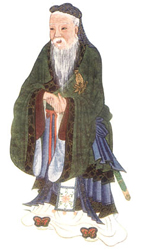 Confucianism,
also known as Ruism or Ru
classicism,
is
a system of thought and behavior originating in ancient
China,
and is variously described as a tradition,
philosophy (humanistic or rationalistic), religion,
theory of government, or way of life. Confucianism
developed from teachings of the Chinese
philosopher Confucius (551–479 BC),
during a time that was later referred to as the Hundred
Schools of Thought era.
Confucius considered himself a transmitter of
cultural values inherited from the Xia (c. 2070–1600 BC), Shang (c. 1600–1046 BC),
and Western
Zhou (c. 1046–771 BC)
dynasties. Confucianism
was suppressed during the Legalist and
autocratic Qin
dynasty (221–206 BC),
but survived. During the Han
dynasty (206 BC
– 220 AD), Confucian approaches edged out the
"proto-Taoist" Huang–Lao as
the official ideology, while the emperors mixed both
with the realist techniques of Legalism.
Confucianism regards principles contained in the Five
Classics, the key tenets that should be followed
to promote the harmony of the family and the society
as a whole. Source
Wikipedia Confucianism,
also known as Ruism or Ru
classicism,
is
a system of thought and behavior originating in ancient
China,
and is variously described as a tradition,
philosophy (humanistic or rationalistic), religion,
theory of government, or way of life. Confucianism
developed from teachings of the Chinese
philosopher Confucius (551–479 BC),
during a time that was later referred to as the Hundred
Schools of Thought era.
Confucius considered himself a transmitter of
cultural values inherited from the Xia (c. 2070–1600 BC), Shang (c. 1600–1046 BC),
and Western
Zhou (c. 1046–771 BC)
dynasties. Confucianism
was suppressed during the Legalist and
autocratic Qin
dynasty (221–206 BC),
but survived. During the Han
dynasty (206 BC
– 220 AD), Confucian approaches edged out the
"proto-Taoist" Huang–Lao as
the official ideology, while the emperors mixed both
with the realist techniques of Legalism.
Confucianism regards principles contained in the Five
Classics, the key tenets that should be followed
to promote the harmony of the family and the society
as a whole. Source
Wikipedia |